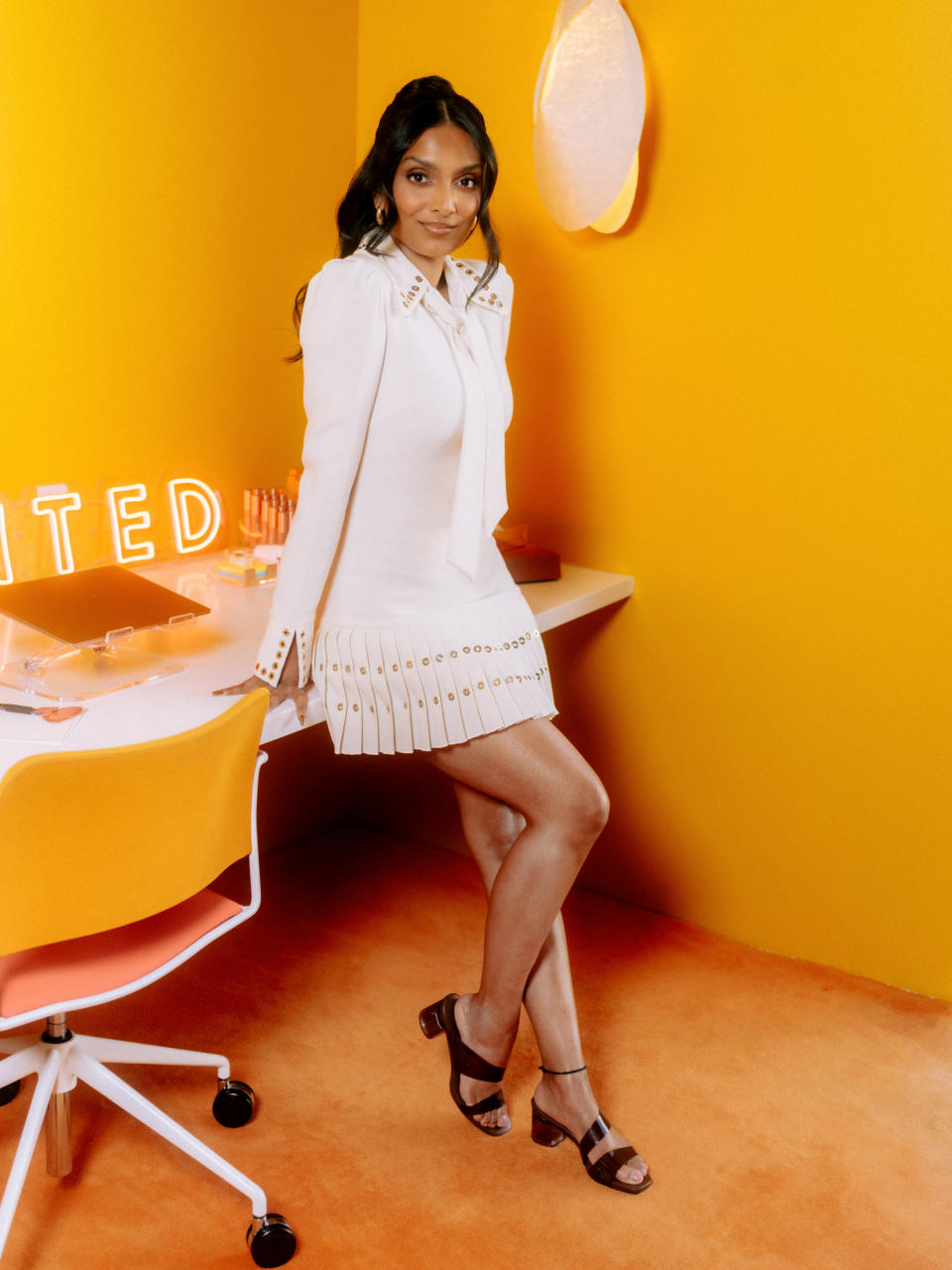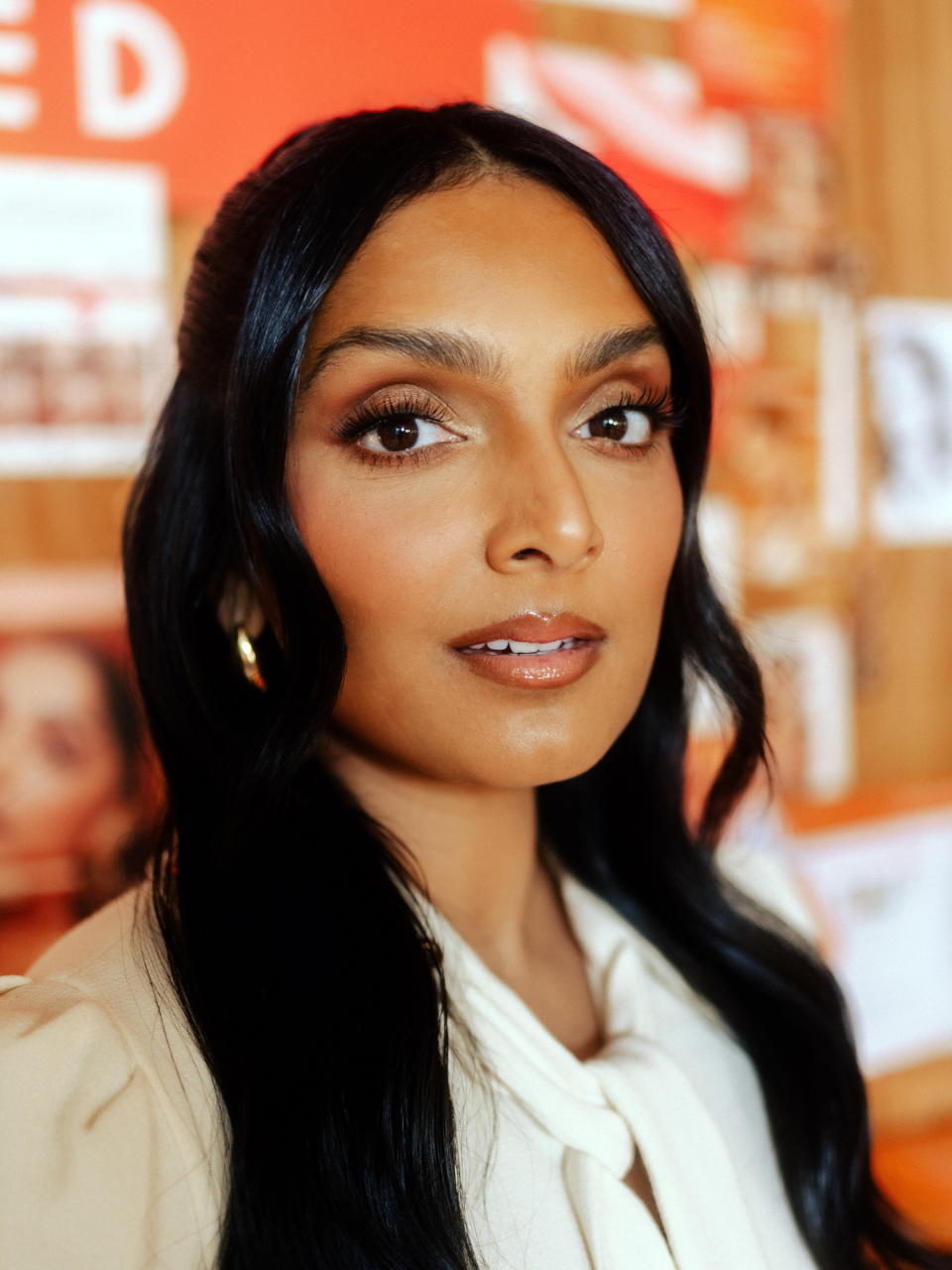Live Tinted’s Deepica Mutyala Brings Her Inclusive Style to Naturalizer

Ninety-seven years old and Naturalizer is still growing into itself.
That works, in part, because the shoe business started off at a good place — Naturalizer touts itself as the first U.S. brand to make shoes specifically designed to the contours of a woman’s foot.
More from WWD
Warby Parker Collaborates on Sunglasses Inspired by Theophilio's Childhood in Jamaica
Gabby Thomas on Stress and Success: How the Olympic Sprinter Is Prepping for Paris 2024
Puma and Formula 1 Launch Collaborative Sneakers, T-Shirts & More
“Innovating for women is their DNA,” said Jay Schmidt, chief executive officer of parent company Caleres Inc., in an interview.
Now the brand is carrying that forward through a collaboration with Deepica Mutyala, the founder and CEO of the inclusive beauty brand Live Tinted.
Nautralizer’s new Gen N Project collaboration series is kicking off with a limited-edition capsule collection of slides called Illuminate. Mutyala helped develop the line and appears in the accompanying ad campaign along with entrepreneur and journalist Lauren Chan and body positivity activist Khrystana. Mutyala selected Unicorn Island Fund — which uses the power of storytelling to change how girls and women are seen, treated and valued — as the charity that will benefit from the line.
The capsule launches Wednesday and features two heel heights and three transparent tints, called 1, 2 and 3. The shoes are priced at $125 and, in keeping with Live Tinted’s naming philosophy, the darkest tint is dubbed 1.

“What we do at Live Tinted is the darkest shade of our complexion products is shade number 1, which historically, you usually see that within beauty, that the lightest shade is shade 1, and then the deepest shade is somewhere at the end of the spectrum,” Mutyala said in a separate interview.
Flipping the script is what the South Asian American beauty entrepreneur does — and she started with her attitude toward her own skin.
“Skin tone and making people feel seen in that capacity is just so important to me,” Mutyala said. “I used to literally hide under an umbrella and was too scared to go in the sun. I never had products that worked for my skin tone. If I came home and I was a few shades darker, my mom would literally cry because it’s so embedded in her that fair is considered beautiful. I dyed my hair blond and got blue contacts growing up, because I so badly wanted to look like what you saw in the magazines.”
She came to embrace her skin tone and started helping others do the same in beauty, where she really started to make her mark with a 2015 YouTube video that showed her using red lipstick to color-correct under-eye circles.
Now she’s bringing that same sensibility to footwear.
“Partnering with massive companies is so important to me — Naturalizer — because it’s like they have the ability to be a part of that change in a big way,” Mutyala said.
While corporate America, including fashion, made a big show of embracing diversity in the wake of George Floyd’s murder at the hands of police in 2020, Mutyala said that “a lot of it was performative.”
“The focus on inclusivity, it feels like it’s fading away, which is another reason why I was very impressed that Naturalizer wanted to keep this conversation going and to start the Gen N Project, they wanted to partner with me,” she said. “Anyone who partners with me knows that that’s going to be the center of what the collab is going to look like.”
The collaboration extends work already underway at Naturalizer, which launched the skin-tone savvy True Colors line in 2019.

As the capsule collection came together, Mutyala was studying up on Naturalizer and trying to reverse-engineer its longevity.
“I am fascinated by the idea that a business has been around for a hundred years,” she said. “You can’t name many that have done that. And it is my dream that we are a legacy brand because there is not a South Asian woman who has built a beauty brand that has lasted a hundred years. And I think it’s important that young girls see that growing up. That’s part of my aspiration around this, is that I used to be really like micro-focused on it. And now I’m way more macro, looking into saying, ‘It is important that I succeed because this brand is bigger than myself.’”
Naturalizer is a good teacher when it comes to lasting power, as it has had to change and change again to keep up with nearly a century’s worth of consumers.
The latest version of the brand started to come together in 2016 when Angelique Joseph was promoted and started leading design for the brand, which was relaunched.
Schmidt said it was a big moment for both Naturalizer and Caleres, which had just changed its name from Brown Shoe Co. the year before.
“We have come a long way, but the shoes back then were very comfort-oriented,” the CEO said of Naturalizer. “They didn’t really have a lot of style to them. The major feeling here was that we could really bring this to a new audience if we really combine that style message along with a great authentic story about fit and comfort and size and inclusivity. Who really doesn’t want stylish, comfortable shoes?”
In effect, Naturalizer skipped a generation and started going after its customer’s granddaughter.
“It kind of took all of the guardrails off the brand and really brought it back for a more modern audience,” Schmidt said. “We had our design teams really dream a little bit and really start creating for that consumer. And guess what? Everyone else came along because, really, who really does want to dress like their mother? Who really wants to dress like their grandmother?
“Once we got the footwear to where we really liked it, we just saw a real eruption of the business,” he said. “Then, obviously, in the pandemic, we went into a kind of slump with the industry in terms of we just had the shutdown period. But it really powered back in a very big way. And I think it’s because really people do have that trust and affinity for the brand right now.”
Naturalizer is a pillar for Caleres, which on Tuesday posted fourth-quarter results that showed adjusted earnings rising to $30.8 million from $23.4 million a year earlier. Sales for the three months ended Feb. 3 inched up 0.1 percent to $697.1 million.
While more than half of the Caleres business comes from its family-friendly Famous Footwear chain, the plan is to move the company’s branded portfolio — which includes Sam Edelman, Allen Edmonds and Vionic in addition to Naturalizer — into the lead position.
Naturalizer was a standout in the fourth quarter, growing sales by double digits, while the whole brand portfolio saw a gain of 4.5 percent.

“We really take brand building seriously,” Schmidt said. “We really come back to, ‘why did it exist in every one of our brands? Why is it relevant? Why do people like it?’ And we’d listen to lots of consumers about this and then take actions based on all of that information and continue to learn from it. So I think it is a continuous discussion.”
Caleres — like the rest of the industry — also had a chance to re-envision its business when the world shut down and started back up.
“We really came out of the pandemic with a goal of the whole company was to bring back the brands in exactly the way you wanted them and leave everything that you don’t want on the table,” Schmidt said. “Every one of our key brands went through that process.”
That process was also helped along by a big rush at Famous Footwear, which benefited from gains in the family retail channel immediately after the pandemic.
“We’re looking at over 50 percent of our sales in three years coming from our brand portfolio, 60 percent of our operating profit for the company, and really continuing to build out all of the pieces for those lead brands,” the CEO said.
And Caleres wants to get there by moving faster — literally.
The company has a “speed program” that takes a page from the fast-fashion playbook and encompasses about 20 percent of its brand portfolio business.
Caleres has worked with its vendors to develop a faster track that lets it quickly replenish looks that work.
“We are able to put shoes back into our inventories to fulfill in less than 90 days with the same quality, the same look, the same feel of the original piece,” Schmidt said. “This type of flexibility and working with a more fluid sourcing model has really been one of the accelerants.
“You develop a lot of shoes to go to market and not all of them sell equally. And no matter who it is, you can’t get them all right out of the gate,” he said. “And so our speed program has really allowed us to do that. It’s also allowed us to manage our inventory really well, so we’re not buying nine and 10 months out and just hoping that it’ll work.”
A relentless focus on the consumer and constant evolution: That is at least Naturalizer’s answer to the question of, How do you get a brand to the century mark — and then beyond?
Best of WWD


